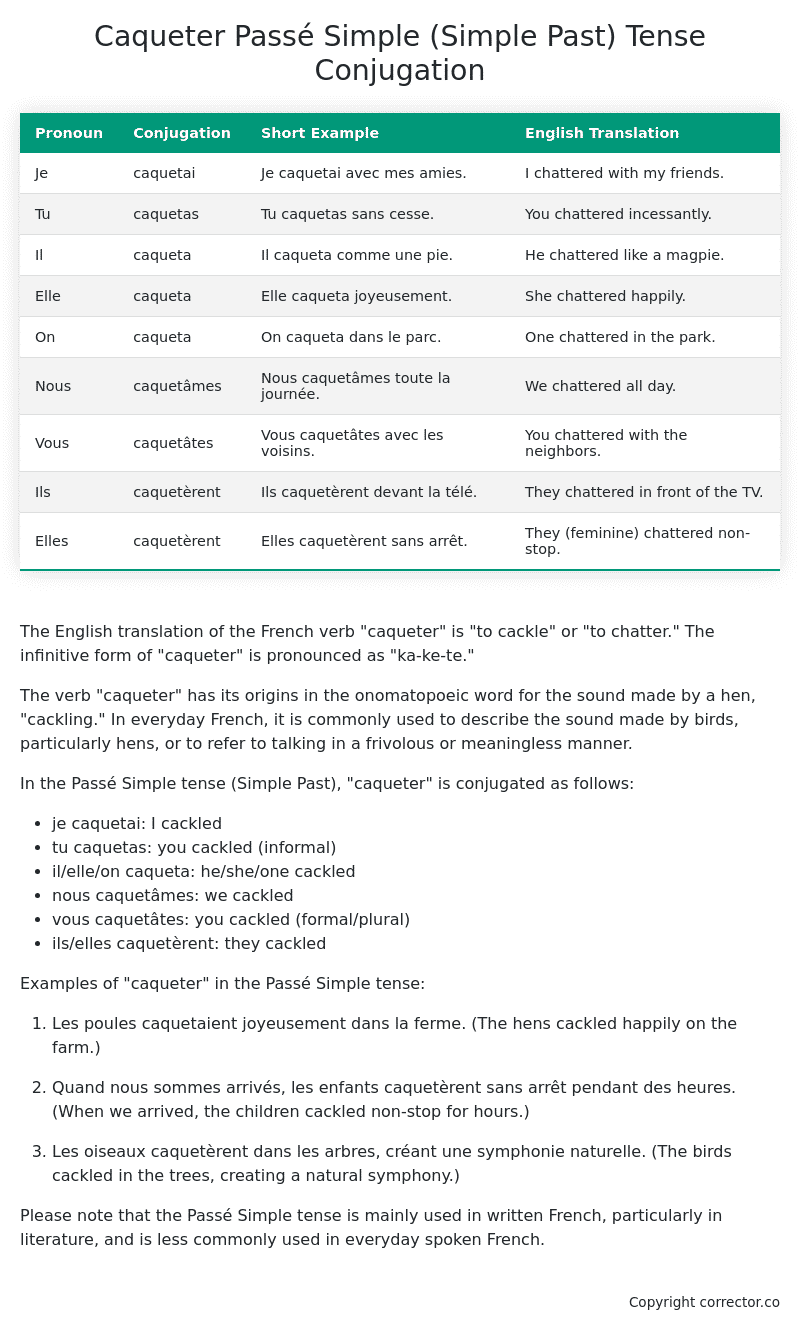Passé Simple (Simple Past) Tense Conjugation of the French Verb caqueter
Introduction to the verb caqueter
The English translation of the French verb “caqueter” is “to cackle” or “to chatter.” The infinitive form of “caqueter” is pronounced as “ka-ke-te.”
The verb “caqueter” has its origins in the onomatopoeic word for the sound made by a hen, “cackling.” In everyday French, it is commonly used to describe the sound made by birds, particularly hens, or to refer to talking in a frivolous or meaningless manner.
In the Passé Simple tense (Simple Past), “caqueter” is conjugated as follows:
- je caquetai: I cackled
- tu caquetas: you cackled (informal)
- il/elle/on caqueta: he/she/one cackled
- nous caquetâmes: we cackled
- vous caquetâtes: you cackled (formal/plural)
- ils/elles caquetèrent: they cackled
Examples of “caqueter” in the Passé Simple tense:
-
Les poules caquetaient joyeusement dans la ferme.
(The hens cackled happily on the farm.) -
Quand nous sommes arrivés, les enfants caquetèrent sans arrêt pendant des heures.
(When we arrived, the children cackled non-stop for hours.) -
Les oiseaux caquetèrent dans les arbres, créant une symphonie naturelle.
(The birds cackled in the trees, creating a natural symphony.)
Please note that the Passé Simple tense is mainly used in written French, particularly in literature, and is less commonly used in everyday spoken French.
Table of the Passé Simple (Simple Past) Tense Conjugation of caqueter
| Pronoun | Conjugation | Short Example | English Translation |
|---|---|---|---|
| Je | caquetai | Je caquetai avec mes amies. | I chattered with my friends. |
| Tu | caquetas | Tu caquetas sans cesse. | You chattered incessantly. |
| Il | caqueta | Il caqueta comme une pie. | He chattered like a magpie. |
| Elle | caqueta | Elle caqueta joyeusement. | She chattered happily. |
| On | caqueta | On caqueta dans le parc. | One chattered in the park. |
| Nous | caquetâmes | Nous caquetâmes toute la journée. | We chattered all day. |
| Vous | caquetâtes | Vous caquetâtes avec les voisins. | You chattered with the neighbors. |
| Ils | caquetèrent | Ils caquetèrent devant la télé. | They chattered in front of the TV. |
| Elles | caquetèrent | Elles caquetèrent sans arrêt. | They (feminine) chattered non-stop. |
Other Conjugations for Caqueter.
Le Present (Present Tense) Conjugation of the French Verb caqueter
Imparfait (Imperfect) Tense Conjugation of the French Verb caqueter
Passé Simple (Simple Past) Tense Conjugation of the French Verb caqueter (You’re reading it right now!)
Passé Composé (Present Perfect) Tense Conjugation of the French Verb caqueter
Futur Simple (Simple Future) Tense Conjugation of the French Verb caqueter
Futur Proche (Near Future) Tense Conjugation of the French Verb caqueter
Plus-que-parfait (Pluperfect) Tense Conjugation of the French Verb caqueter
Passé Antérieur (Past Anterior) Tense Conjugation of the French Verb caqueter
Futur Antérieur (Future Anterior) Tense Conjugation of the French Verb caqueter
Subjonctif Présent (Subjunctive Present) Tense Conjugation of the French Verb caqueter
Subjonctif Passé (Subjunctive Past) Tense Conjugation of the French Verb caqueter
Subjonctif Imparfait (Subjunctive Imperfect) Tense Conjugation of the French Verb caqueter
Subjonctif Plus-que-parfait (Subjunctive Pluperfect) Tense Conjugation of the French Verb caqueter
Conditionnel Présent (Conditional Present) Tense Conjugation of the French Verb caqueter
Conditionnel Passé (Conditional Past) Tense Conjugation of the French Verb caqueter
Conditionnel Passé II (Conditional Past II) Tense Conjugation of the French Verb caqueter
L’impératif Présent (Imperative Present) Tense Conjugation of the French Verb caqueter
L’impératif Passé (Imperative Past) Tense Conjugation of the French Verb caqueter
L’infinitif Présent (Infinitive Present) Tense Conjugation of the French Verb caqueter
L’infinitif Passé (Infinitive Past) Tense Conjugation of the French Verb caqueter
Le Participe Présent (Present Participle) Tense Conjugation of the French Verb caqueter
Le Participe Passé (Past Participle) Tense Conjugation of the French Verb caqueter
Struggling with French verbs or the language in general? Why not use our free French Grammar Checker – no registration required!
Get a FREE Download Study Sheet of this Conjugation 🔥
Simply right click the image below, click “save image” and get your free reference for the caqueter Passé Simple tense conjugation!

Caqueter – About the French Passé Simple (Simple Past) Tense
Formation
Usage
Narration
Historical Context
Interactions with other tenses
Passé Composé
Imparfait
Conditional and Subjunctive
Summary
I hope you enjoyed this article on the verb caqueter. Still in a learning mood? Check out another TOTALLY random French verb conjugation!


